The Cornell Lab Bird Academy › Discussion Groups › Virtual Educator Retreat: Inspiring Investigations through Citizen Science › Virtual Educator Retreat: Intro to Inquiry
-
Bird AcademyBird AcademyAfter reading the different definitions of inquiry in the chapter and considering responses from other course participants, what is your concept of “inquiry?” Through the discussion board below, share your definition of inquiry, and an image of the concept map you drew. You can take a picture and upload it to the discussion below.
- The forum ‘Virtual Educator Retreat: Inspiring Investigations through Citizen Science’ is closed to new topics and replies.
-
As teachers, we really want inquiry to fit neatly into a set of parameters - easy to follow, easy to grade. However, this is not the case. It is something that looks different from concept or concept, from person to person - it is not one size fits all
 . It something that is intrinsic to babies and little children, but ends up being "taught away" as they go through school.
. It something that is intrinsic to babies and little children, but ends up being "taught away" as they go through school. -
 Inquiry is actively observing, questioning and trying to figure out what you are observing. Inquiry is not something that is "done" to an individual... the energy and the train of thought comes from the individual. Someone else can point things out, or ask questions, but inquiry is personal!
Inquiry is actively observing, questioning and trying to figure out what you are observing. Inquiry is not something that is "done" to an individual... the energy and the train of thought comes from the individual. Someone else can point things out, or ask questions, but inquiry is personal! -
Inquiry is dependent on the interaction of each person with nature. Any age can be involved in inquiry but the younger the student the more instructor/adult led. Inquiry starts with a phenomena for the observer which then leads to questions and interactions using their senses. Inquiry is also individualized through the observations and results.

-
I agree with you that "inquiry is individualized through each person's observations". It is an individual experience that is then shared.
-
I appreciate the reminder that we are inquiring using our senses. I think that I want to be more aware of this with students, not just the five senses that we normally think of, but also how students feel.... especially as I ask them to possibly deal with the discomfort of "not knowing".
-
-
I work in a Botanical Garden and so do not have students for much sustained time, and therefore little time to develop much of the processes outlined here in an extensive way. However, as we explore outside (I have 3-5-year-olds to adults in a variety of programs) we are constantly coming upon natural treasures that spark curiosity, prompt questions, lead us to think about what we know about something already, and how what we have discovered fits with that prior knowledge. Our discovery often prompts questions and leads us to further research into what we have found and how it connects to other aspects of the natural world. I am very careful to always present myself as a co-learner with the group; as a naturalist, you are almost by definition interested in nature, but far from an "expert" in any aspect of that realm. When I first started in my position as an educator at the Garden I knew very little about the natural world. My supervisor knew about inquiry-based learning and I found it so incredibly foreign. I was so totally bought up in the teacher gives knowledge to the pupil model that it was hard for me to even conceive of how to formulate questions. I love the emphasis in these writings of inquiry as something we do naturally and the freedom from structure/step-by-step process and the search for the "correct" answer which totally destroyed any love of science I may have had in high school.

-
Hi Sue, I love that you have thought out of the box since you don't have sustained students, it's a unique style of education, but the same final goal can still be reached! I like that you focused in on the spiders too!
-
Having students observe in a botanical garden is great since there will be many opportunities for observing. I think that even experts would be co-learners, since we can learn something new all the time.
-
-

-
Inquiry starts with lots of observations of your natural world. It also includes something in the natural world that can't be easily explained and causes someone to ask follow up questions. (I find with my students we need to practice answering, "I notice," and "I wonder" questions to both build their confidence in what my students notice and help them explicitly state their questions.) Then, one needs to coach students on how to ask a testable question and identify what information would help them answer that question. At this point, students brainstorm with fellow scientists and draft a procedure. Before starting their procedure, they present their ideas to other scientists, to get feedback and help with any problems that have come up. Students then follow their procedures, collecting data and observations. When students analyze data, they practice looking for patterns, choosing ways to present their ideas to fellow scientists. At all points during this process, new questions, wonderings can arise.
-
@Laura "I notice and I wonder questions" are a great way to approach observations. It is important to help students differentiate between the actual observation and their own inferences.
-
@Laura I agree that students need to practice the "I notice" and "I wonder" questions, both informing them and answering them! Brainstorming with fellow scientists is also a great way for students to build their confidence and understanding.
-
-
Inquiry is the intuitive human experience of learning through our senses, actions, and thoughts as guided by the process of questioning. Unlike rote memorization from a textbook or source material, the learner constructs their knowledge as they explore and seek their own answers to questions of interest to them. I started my concept map before reading the article, and then I added to it in the second picture.


-
I like your additions to your concept map. Concept maps are great to go back to later and add on.
-
-
Inquiry is the concept of asking questions to gain understanding about any topic and promote further understanding. Inquiry is used by all classrooms, whether formal or informal, to help students of all ages explore deeper into a subject. It often starts with 'out of the blue' questions that students are curious about.

-
Yes, those "out of the blue" questions can be interesting and lead to really great learning opportunities.
-
-
I really appreciated reading the different definitions. I had been thinking about inquiry as an approximation of doing science but in a guided or truncated way. The definitions pushed my understanding of it. I appreciated the comment about repeating experiments as that isn't something I had factored into the inquiry projects I have been doing. I also enjoyed the many comments about leading with student derived questions. I have often found it challenging to help students develop questions on their own and have sided on giving them a narrow set of choices. Through reading the descriptions I see more access points to the inquiry cycle and different ways to pique interest.

-
I too am guilty of offering a narrow choice of options for students doing inquiry. What are these other access points you have found? Logistically, how could it work in a classroom full of students?
-
I too like the idea of "repeating experiments". One of the issues I have encountered is cost. I usually have had to pay out of pocket for many supplies at my schools in the past, and repeating experiments is costly.
-
-
I believe that inquiry starts with curiosity about something that has been observed. It doesn't have to be formal, such as in a classroom, but can happen anywhere or at any time. This curiosity leads to an investigation which can lead to answers, and can also lead to more questions. Not all inquiry leads to answers. Sometimes there are no answers.

-
I really like your idea that " it can be anywhere at anytime". I like the idea that learning and curiosity is everywhere.
-
I appreciate your awareness that we will need to accept not knowing the answer and develop the mindset to continue to be curious even in the face of uncertainty!
-
-
 I tried to think about inquiry with a concrete phenomena to capture the concept. In my work inquiry begins with an authentic scientific phenomena that needs to be investigated, and if possible, have potential solutions. I try to make the phenomena locally or personally relevant. Since I live in Washington, I thought about the Sage Grouse, which is an endangered species in this state. I would ask the students to think around why the numbers of Sage Grouse are declining and let them brainstorm, research, talk to their families and perhaps local community members about why they think it is happening. If possible, I would take them to the territory where Sage Grouse live or where they used to be prevalent. Then I would ask students to brainstorm solutions to the decline, offering citizen science as a possible way to contribute to the larger body of science that is working this problem.
I tried to think about inquiry with a concrete phenomena to capture the concept. In my work inquiry begins with an authentic scientific phenomena that needs to be investigated, and if possible, have potential solutions. I try to make the phenomena locally or personally relevant. Since I live in Washington, I thought about the Sage Grouse, which is an endangered species in this state. I would ask the students to think around why the numbers of Sage Grouse are declining and let them brainstorm, research, talk to their families and perhaps local community members about why they think it is happening. If possible, I would take them to the territory where Sage Grouse live or where they used to be prevalent. Then I would ask students to brainstorm solutions to the decline, offering citizen science as a possible way to contribute to the larger body of science that is working this problem. -
Making it "relevant or local" is a great way to stimulate interest.
-
-
To me, scientific inquiry can be any of a multitude of methods to observe, explore and explain the natural world around us. Teachers should try to create an environment and be experienced enough for students to succeed in getting used to asking questions and exploring and using those experiences from the natural world to answer these questions.

-
You made a good point about getting students used to "asking questions". Asking questions that can be answered through observation or experimentation is a skill.
-
-
Inquiry is a process in which individuals consider a phenomenon, ask questions about its nature, and then propose way of understanding that phenomenon. It requires the inquirer to then choose tools and methods that can help to better understand the phenomenon, collecting and analyzing data to give insight. The process is iterative, with the scientist repeatedly asking new questions, proposing new answers and collection additional data.

-
I like that you mentioned the "iterative" nature of the process of science; this is true.
-
-
I ended up with a lot on my inquiry map! I work in early childhood and see inquiry as the basis for most learning in this space, not just for science. So, there's a lot to my map. At it's core I feel inquiry is defined as child-led and child-centered with the teacher acting as guide and mentor.

-
It is always great when teachers can step back and act more as a mentor and direct the class less. I agree that it is best when the work is student centered.
-
Young kids are so great at wondering!
-
I love how deeply you thought about this. I really like it when kids can take control and be a true stakeholder in their learning.
-
-
Compared to many others, I think my map is simpler. In the back of my mind, I know that this fall, my students will not have been in class for perhaps up to 18 months due to the pandemic. How do I encourage them to keep coming back, to put in the time necessary to learn science? The answer is not to be found in delivering stellar lectures or reading our text books. I think the answer lies in creating opportunities for learning through inquiry.

-
I really like your comment about "creating opportunities for learning through inquiry". I once set up a quadraphonic tank in my classroom, and we discussed it every day. Every day the students had new questions and observations. It wasn't really a lesson per se, but an opportunity to learn through inquiry.
-

-
@ruchi For me inquiry is a process to relate with your surroundings or learning through the real world experiences. It emerges from how you perceive and observe the world around you that further generates curiosity to know more. And then you begin to explore and experiment, you are able to identify certain issues or facts and you act and analyse. You reflect and look for possibilities to improvise and further unlearn and re-learn.
-
-
This is my initial concept map before reading the chapter. In defining inquiry my initial response is that inquiry is asking questions and searching for the answers - both the why and the how. This is innately both simple and complex. In thinking about students, I immediately thought of toddlers and their constant asking, "Why?" - the earliest form of learning and exploration. It seems to me that all true and lasting learning in all disciplines comes from asking questions. It is taking what we already know and building on that knowledge with continued questions. There are several things that struck me while reading the chapter. I liked how the author talked about a "disequilibrium in the mind" that has to happen and is crucial to the process of inquiry. Because inquiry is process-based, there has to be time to allow for pondering/wondering in order for this "disequilibrium" to occur. And because the process isn't nice, neat and linear, it's often difficult to allow for this time in a traditional science classroom setting. Use of the scientific method in the traditional classroom setting is often more results-focused than process-focused. This quote from Hunkins (1995) stood out to me: "In many schools, students are not challenged to make meaning; rather, they are asked to remember the meaning of others." If we want to guide students of any age to independent, lifelong learning, the challenge then is to find ways to encourage their innate curiosity and guide them through the inquiry process so they can create meaning.

-
I actually struggled with this a bit considering inquiry to be part of the cyclical part of someone's nature, but also something any individual can be a part of regardless of their interests. That any part of the "cycle" can be an onboarding step for individuals to be a part of. Also that not all inquiry has results, that "failure" in a sense is a part of this cycle, you don't always get the result or get to see the observation you were hoping for.

-
I like the inclusion of "interests"... I think that finding something that a student has an interest in is a great place to start inquiry!
-
-
 I created my concept map before reading the article. I viewed inquiry as a multi-step approach to answering questions raised by observations. After reading the article and other participants' responses I would probably add additional descriptive words, but I feel that the process is still the same. I agree that curiosity is essential to this process. I also feel that as a practitioner, a sense of curiosity may have to be fostered in students, who may not have had the freedom to be curious before.
I created my concept map before reading the article. I viewed inquiry as a multi-step approach to answering questions raised by observations. After reading the article and other participants' responses I would probably add additional descriptive words, but I feel that the process is still the same. I agree that curiosity is essential to this process. I also feel that as a practitioner, a sense of curiosity may have to be fostered in students, who may not have had the freedom to be curious before. -
I followed the instruction in the readings that I begin creating a personal concept map of inquiry prior to reading the different definitions of inquiry (drawings and characters in black). Afterwards, I added keywords from the definitions that I agree with (drawings and characters in blue). The end result of my edited conceptual drawing points to curiosity as a critical success factor to keep learners to keep on asking questions to seek understanding of some interesting observation. This understanding leads to a new knowledge or information directing the learner to take action or to design and implement a solution to the identified problem.

-
I agree that curiosity is key to this process. Do you have any ideas on how to foster curiosity in students who maybe have already been conditioned to not express it in a classroom setting?
-
-
Inquiry is the act of asking questions and being curious about the nature of how things work. I agree that children are naturally inquisitive but also that it gets tempered at an earlier age than when they first walk into a science classroom. Unfortunately, students become conditioned to being given information and how to think instead of figuring it out for themselves. Inquiry becomes easier when students realize that they don’t have to be correct and accurate. It is difficult to change their mindset that it isn’t all about getting the right answer.

-
When I think of science in high school I think of failing to get it "right". Science was memorizing information, I remember very little curiosity or fascination involved!
-
I love that you included "accept mistakes". I also agree that many students today are so used to just "googling" the answer to things. And then they try to just copy and paste the answer rather than really exploring the why's. They forget that even the reliable Googled answers were found through a process.
-
-
 Inquiry is asking complex question(s) on a topic/problem that interests you to make sense of the world around you. Inquiry includes questioning,observing, discussion, data collection, redefining your question, reworking your research/design or method to answer a question(s). Looking at that question through a systems lens.
Inquiry is asking complex question(s) on a topic/problem that interests you to make sense of the world around you. Inquiry includes questioning,observing, discussion, data collection, redefining your question, reworking your research/design or method to answer a question(s). Looking at that question through a systems lens. -
After reading this chapter my concept of inquiry has certainly been adjusted. I still feel I have primary components of my original definition that aligned with many of the definitions within the reading. I still believe inquiry based learning should be a type of learning that is passion based and hands-on. Allowing learners to discover their own passions and ways of thinking allows them to utilize unique ways of learning and making discoveries. Having the ability to provide an "in-the-field" learning environment can allow learners to be challenged with more real-world issues instead of trying to conduct research just in a classroom or though a textbook. I also noted that the Inquiry Cycle very much reminded me of how I learned the scientific method should be taught when I was taking pedagogy courses in college. Science is never linear in its process, instead it is very much like the concept maps we just created, interconnected in an immeasurable amount of ways. Something that continuously jumps back and forth and creates new branches. I certainly have new ideas added on to my concept of inquiry but much of my core belief is still set in stone.

-
I appreciated the Myths about inquiry. It is very challenging as educators to change our mind set and practice. But if we can let students questions and observations lead to their own investigations we will help them develop skills of problem solving.
-
I think inquiry involves a learning process and mindset that starts with wonderment then follows a path of investigation through data collection and analysis to make connections to learn about the phenomenon in question.

-
 After Reading the article, I decided to use 5 categories to the concept map in order to define inquiry. The first two were what inquiry could be based on and what it can be, such as what form it could take. Inquiry can be based on previous knowledge, personal interests, questions, and stimulation of the senses, to name a few jumping off points for inquiry. The process of inquiry could be experiential, such as a hot air balloon ride to try to observe and understand the lifting properties of hot air or lift itself. The process could be a project based approach, and experiment or exploration of the natural world around us. Inquiry often utilizes a strong curiosity, problem solving skills, interpretation of evidence, and communication. Requirements for inquiry could include testing, training in the use of tools or processes, and time to gather evidence for analysis. Inquiry can lead to discovery, understanding, answers, motivation to learn more, find answers, make observations and construction of knowledge.
After Reading the article, I decided to use 5 categories to the concept map in order to define inquiry. The first two were what inquiry could be based on and what it can be, such as what form it could take. Inquiry can be based on previous knowledge, personal interests, questions, and stimulation of the senses, to name a few jumping off points for inquiry. The process of inquiry could be experiential, such as a hot air balloon ride to try to observe and understand the lifting properties of hot air or lift itself. The process could be a project based approach, and experiment or exploration of the natural world around us. Inquiry often utilizes a strong curiosity, problem solving skills, interpretation of evidence, and communication. Requirements for inquiry could include testing, training in the use of tools or processes, and time to gather evidence for analysis. Inquiry can lead to discovery, understanding, answers, motivation to learn more, find answers, make observations and construction of knowledge.
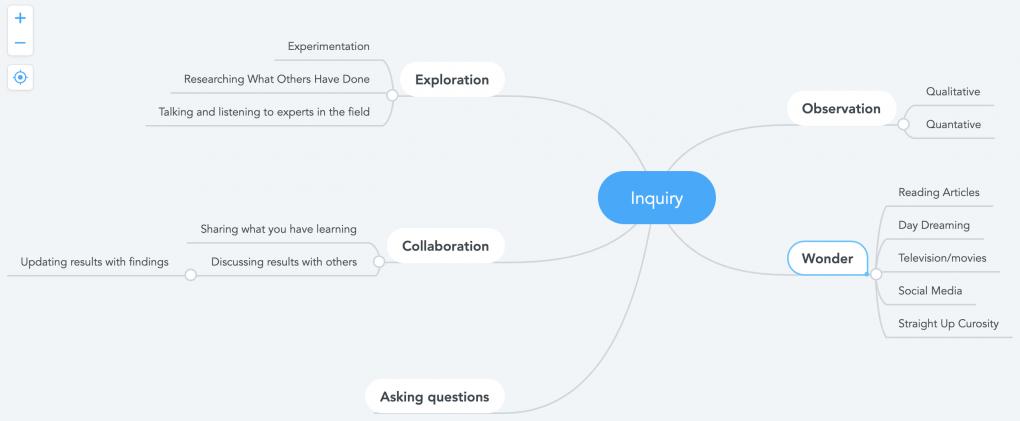 . It something that is intrinsic to babies and little children, but ends up being "taught away" as they go through school.
. It something that is intrinsic to babies and little children, but ends up being "taught away" as they go through school. 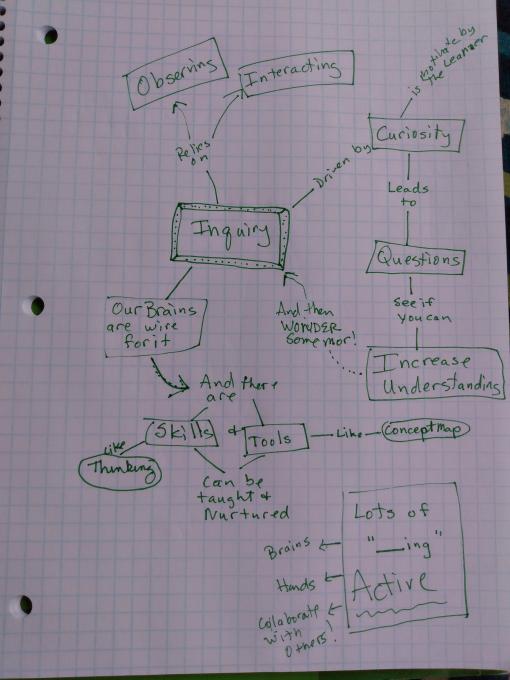 Inquiry is actively observing, questioning and trying to figure out what you are observing. Inquiry is not something that is "done" to an individual... the energy and the train of thought comes from the individual. Someone else can point things out, or ask questions, but inquiry is personal!
Inquiry is actively observing, questioning and trying to figure out what you are observing. Inquiry is not something that is "done" to an individual... the energy and the train of thought comes from the individual. Someone else can point things out, or ask questions, but inquiry is personal! 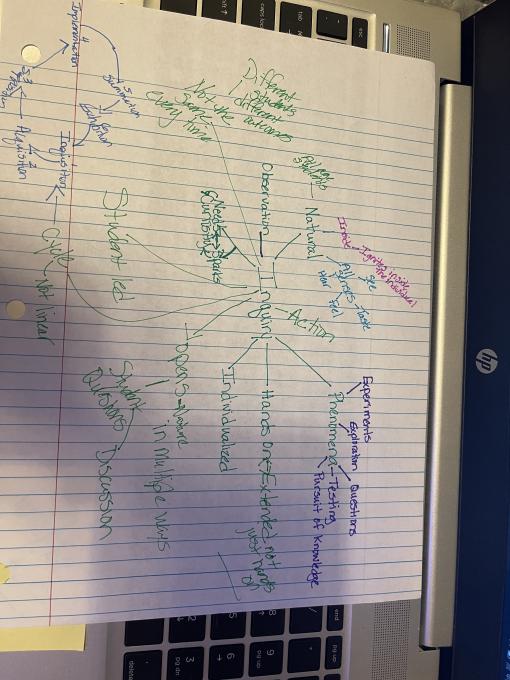
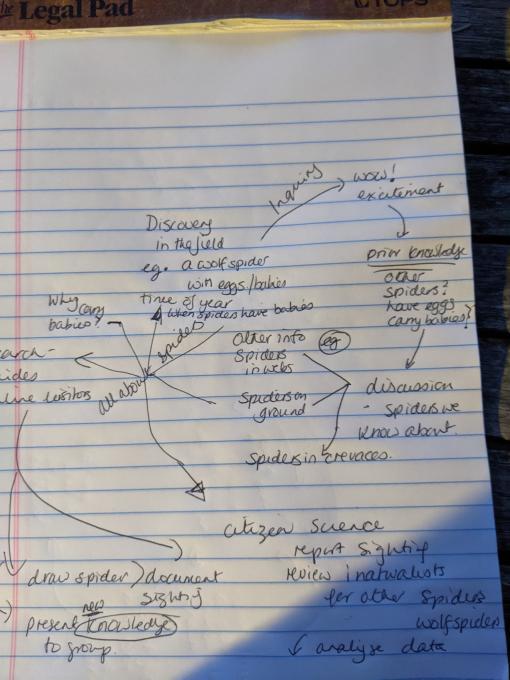
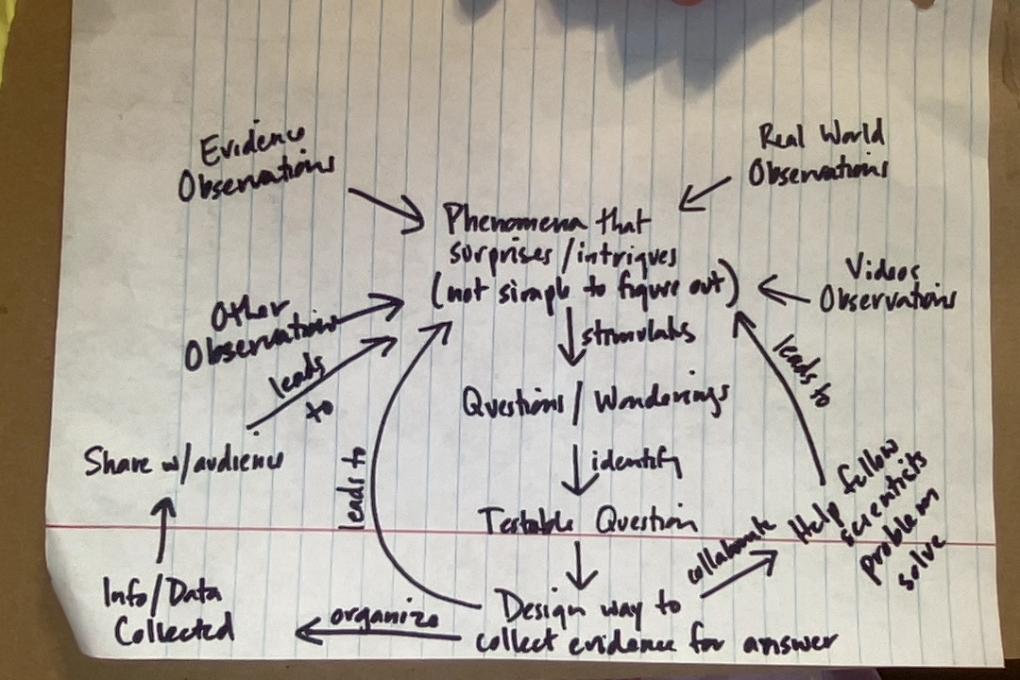
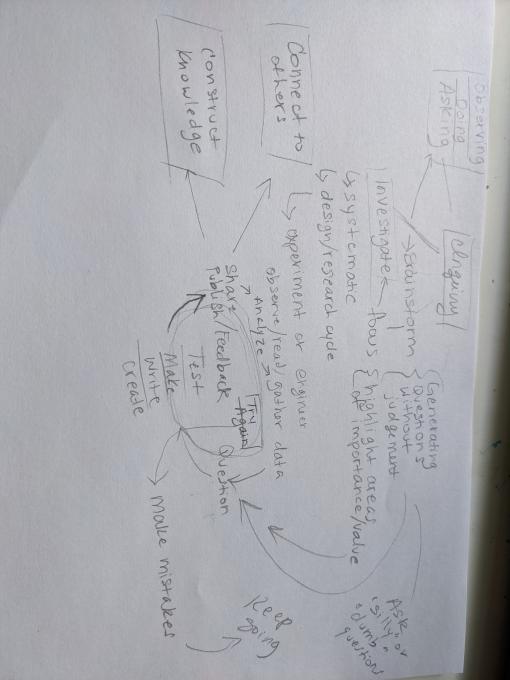
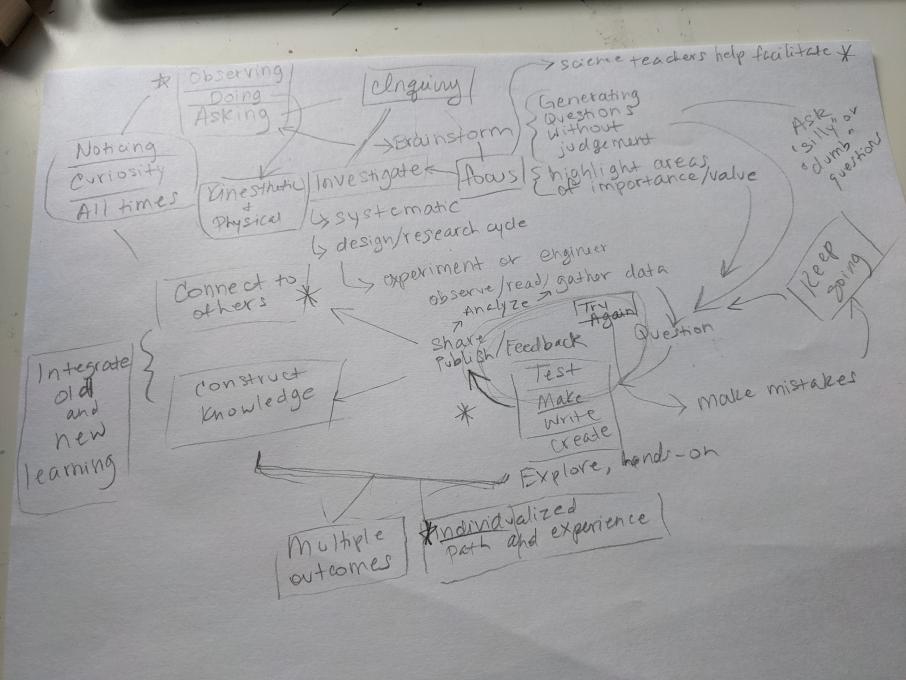
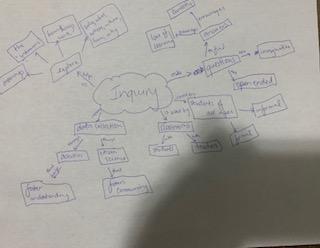
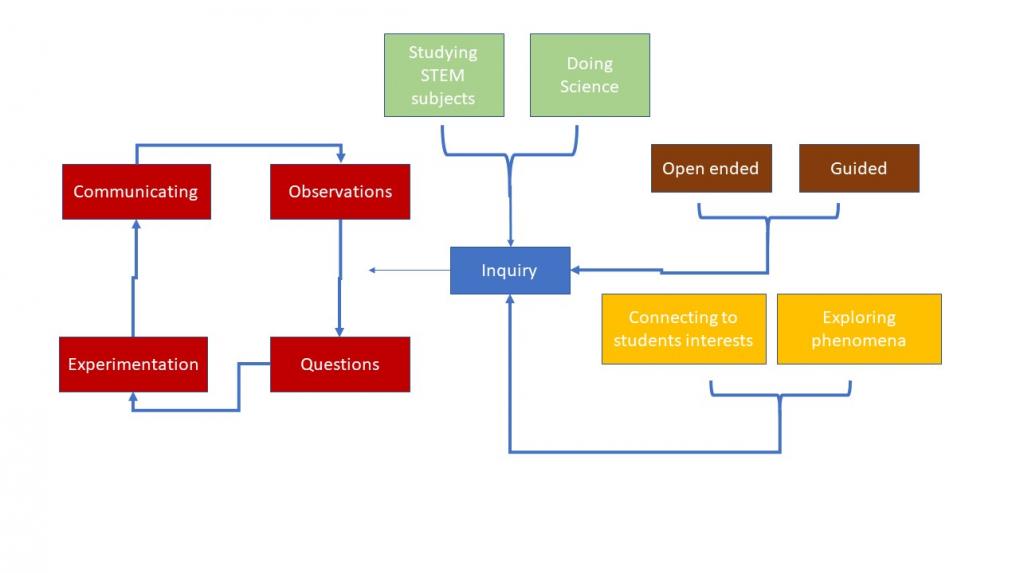
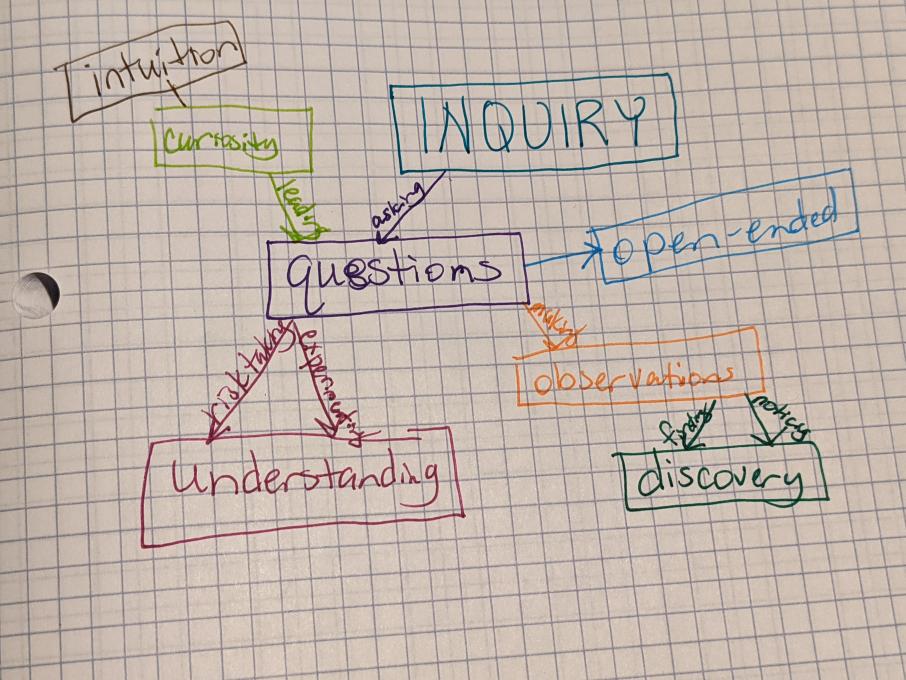
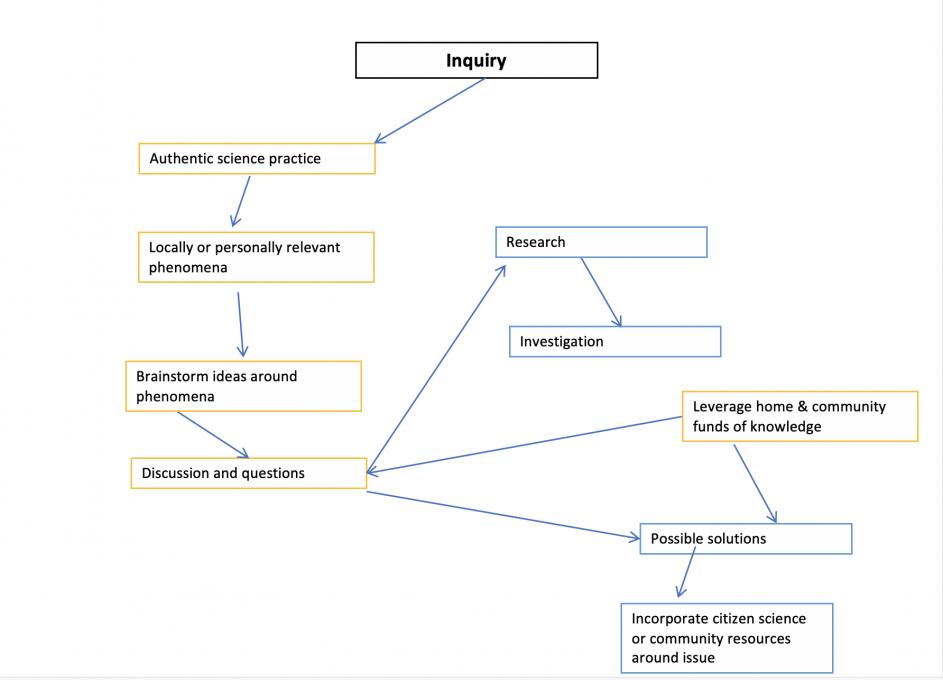 I tried to think about inquiry with a concrete phenomena to capture the concept. In my work inquiry begins with an authentic scientific phenomena that needs to be investigated, and if possible, have potential solutions. I try to make the phenomena locally or personally relevant. Since I live in Washington, I thought about the Sage Grouse, which is an endangered species in this state. I would ask the students to think around why the numbers of Sage Grouse are declining and let them brainstorm, research, talk to their families and perhaps local community members about why they think it is happening. If possible, I would take them to the territory where Sage Grouse live or where they used to be prevalent. Then I would ask students to brainstorm solutions to the decline, offering citizen science as a possible way to contribute to the larger body of science that is working this problem.
I tried to think about inquiry with a concrete phenomena to capture the concept. In my work inquiry begins with an authentic scientific phenomena that needs to be investigated, and if possible, have potential solutions. I try to make the phenomena locally or personally relevant. Since I live in Washington, I thought about the Sage Grouse, which is an endangered species in this state. I would ask the students to think around why the numbers of Sage Grouse are declining and let them brainstorm, research, talk to their families and perhaps local community members about why they think it is happening. If possible, I would take them to the territory where Sage Grouse live or where they used to be prevalent. Then I would ask students to brainstorm solutions to the decline, offering citizen science as a possible way to contribute to the larger body of science that is working this problem. 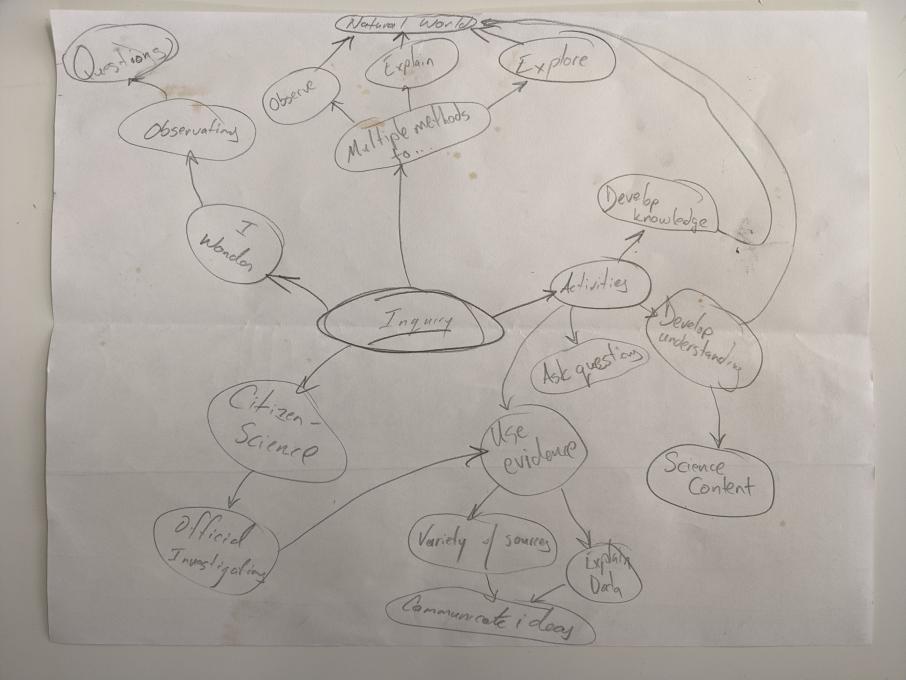
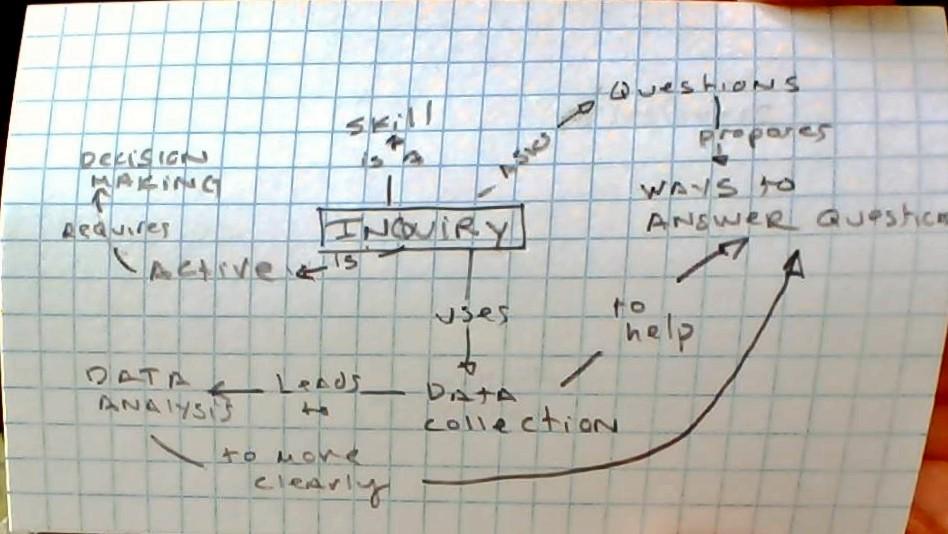
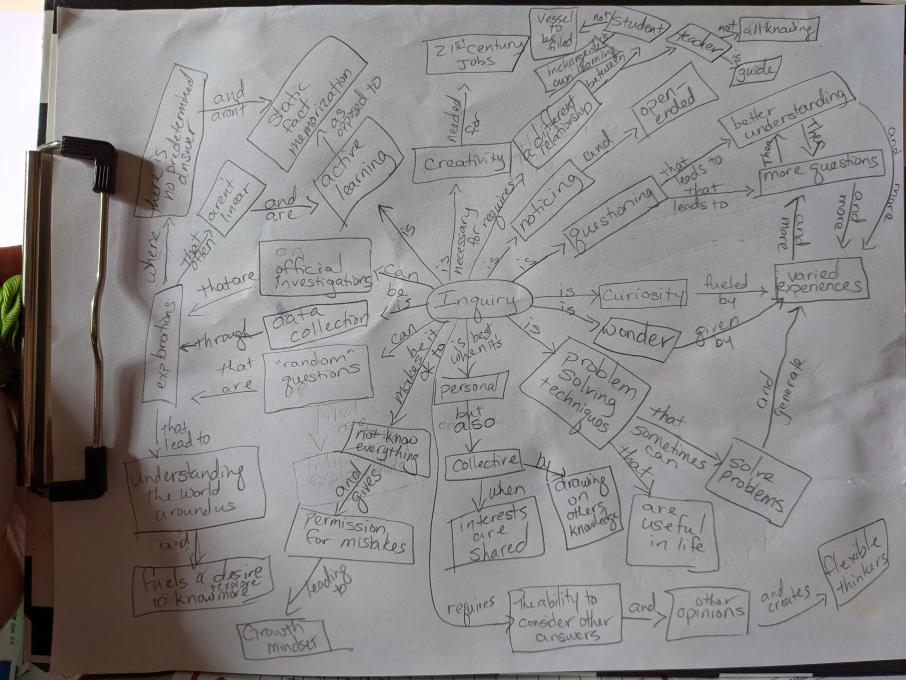
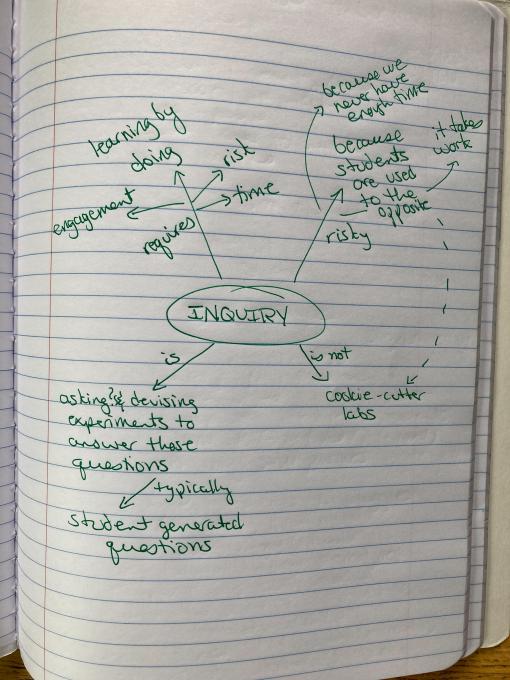
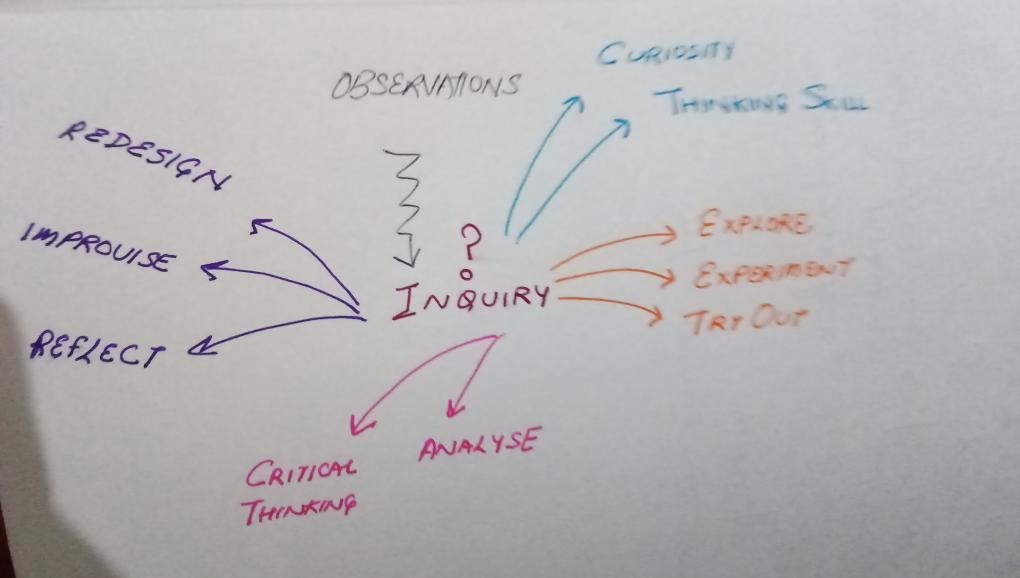
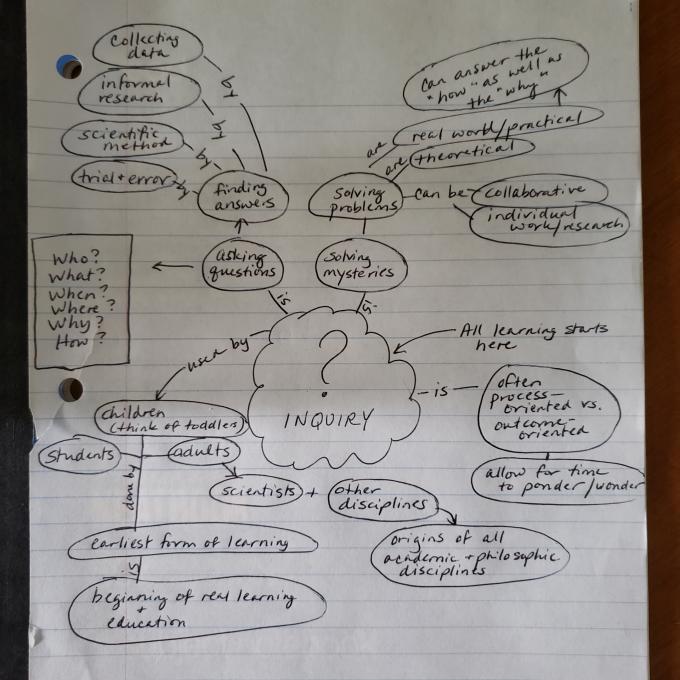
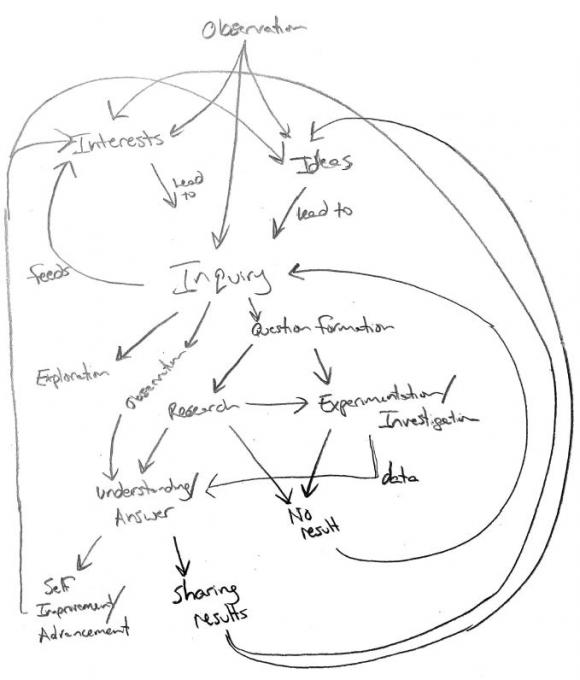
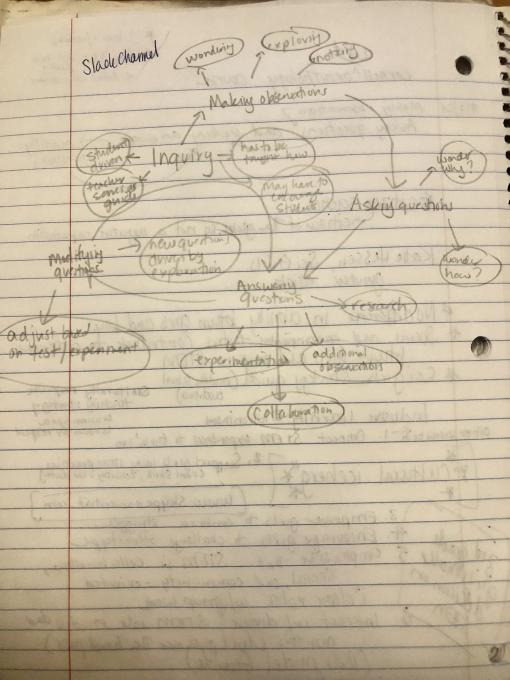 I created my concept map before reading the article. I viewed inquiry as a multi-step approach to answering questions raised by observations. After reading the article and other participants' responses I would probably add additional descriptive words, but I feel that the process is still the same. I agree that curiosity is essential to this process. I also feel that as a practitioner, a sense of curiosity may have to be fostered in students, who may not have had the freedom to be curious before.
I created my concept map before reading the article. I viewed inquiry as a multi-step approach to answering questions raised by observations. After reading the article and other participants' responses I would probably add additional descriptive words, but I feel that the process is still the same. I agree that curiosity is essential to this process. I also feel that as a practitioner, a sense of curiosity may have to be fostered in students, who may not have had the freedom to be curious before. 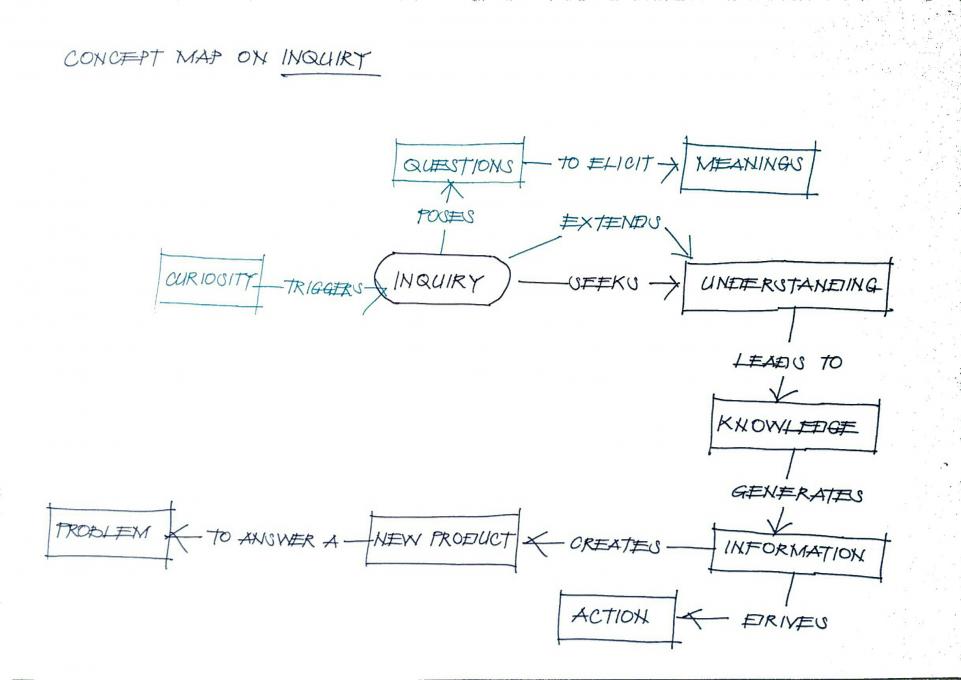
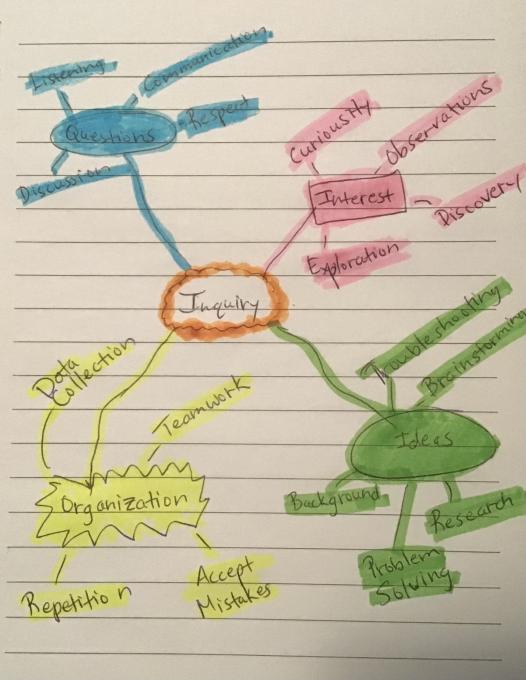
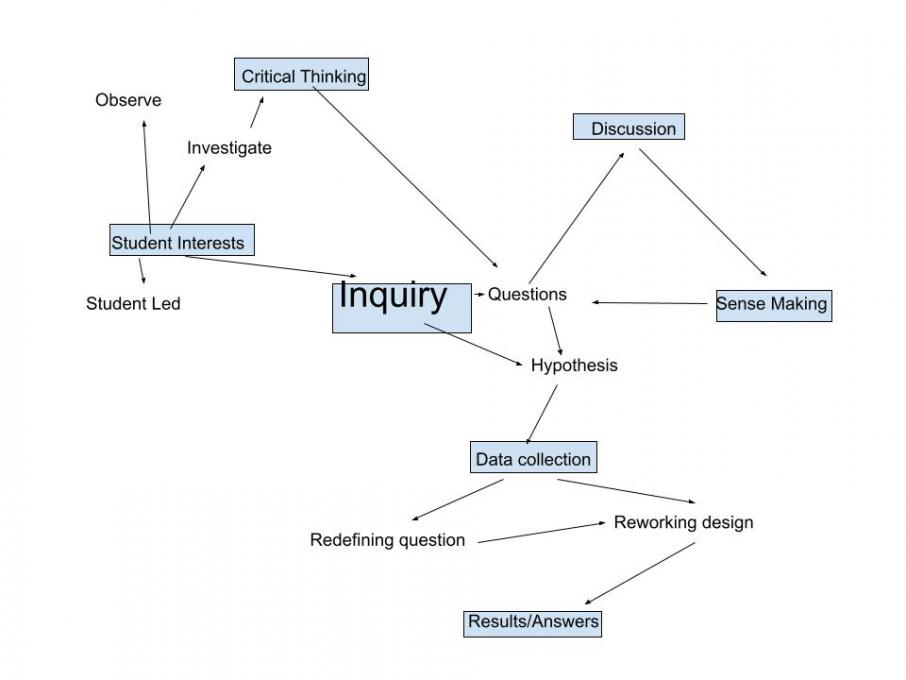 Inquiry is asking complex question(s) on a topic/problem that interests you to make sense of the world around you. Inquiry includes questioning,observing, discussion, data collection, redefining your question, reworking your research/design or method to answer a question(s). Looking at that question through a systems lens.
Inquiry is asking complex question(s) on a topic/problem that interests you to make sense of the world around you. Inquiry includes questioning,observing, discussion, data collection, redefining your question, reworking your research/design or method to answer a question(s). Looking at that question through a systems lens. 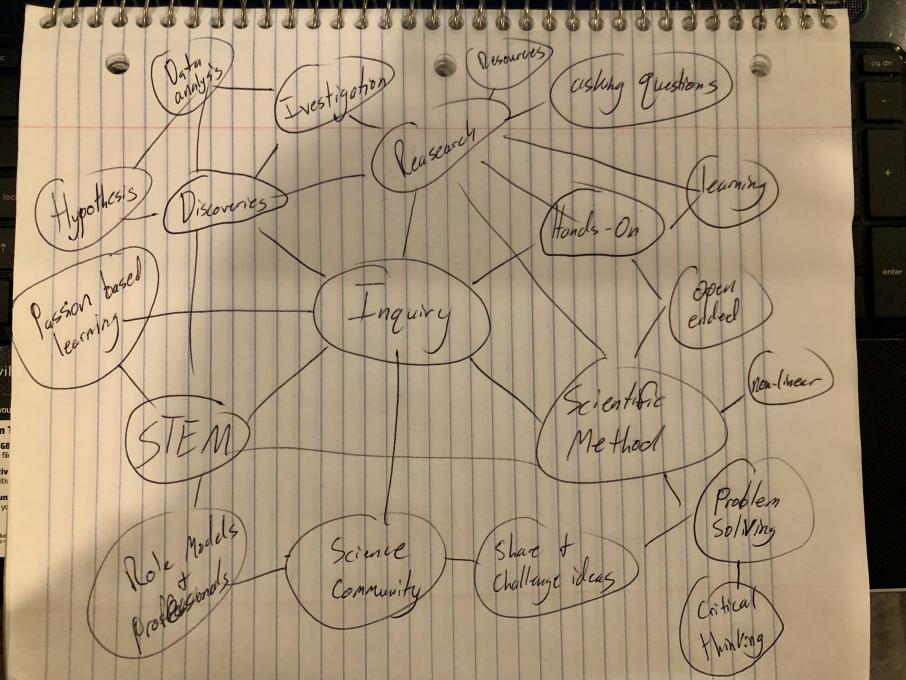
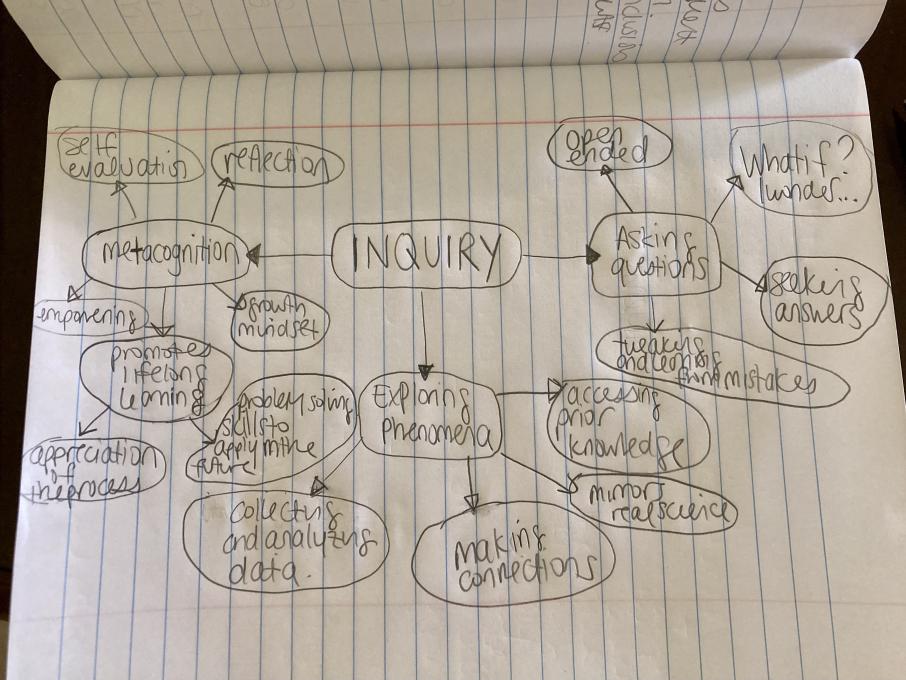
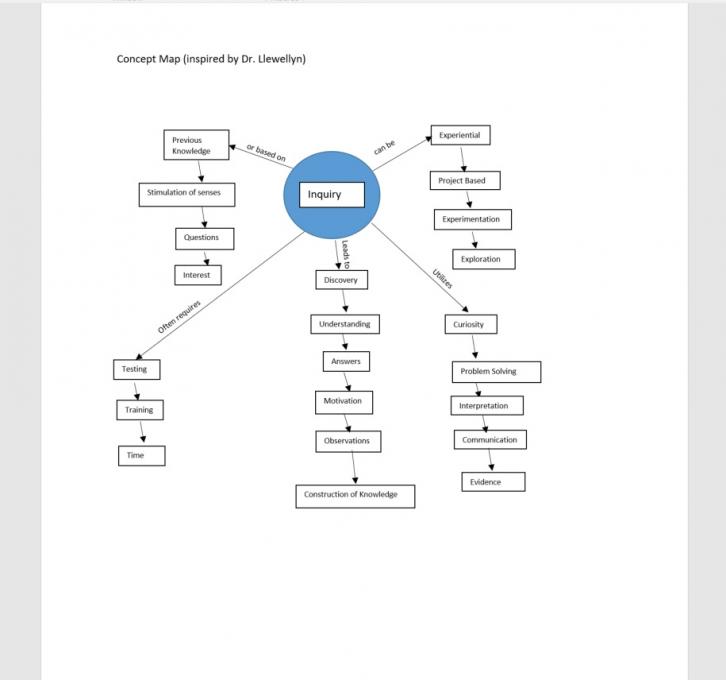 After Reading the article, I decided to use 5 categories to the concept map in order to define inquiry. The first two were what inquiry could be based on and what it can be, such as what form it could take. Inquiry can be based on previous knowledge, personal interests, questions, and stimulation of the senses, to name a few jumping off points for inquiry. The process of inquiry could be experiential, such as a hot air balloon ride to try to observe and understand the lifting properties of hot air or lift itself. The process could be a project based approach, and experiment or exploration of the natural world around us. Inquiry often utilizes a strong curiosity, problem solving skills, interpretation of evidence, and communication. Requirements for inquiry could include testing, training in the use of tools or processes, and time to gather evidence for analysis. Inquiry can lead to discovery, understanding, answers, motivation to learn more, find answers, make observations and construction of knowledge.
After Reading the article, I decided to use 5 categories to the concept map in order to define inquiry. The first two were what inquiry could be based on and what it can be, such as what form it could take. Inquiry can be based on previous knowledge, personal interests, questions, and stimulation of the senses, to name a few jumping off points for inquiry. The process of inquiry could be experiential, such as a hot air balloon ride to try to observe and understand the lifting properties of hot air or lift itself. The process could be a project based approach, and experiment or exploration of the natural world around us. Inquiry often utilizes a strong curiosity, problem solving skills, interpretation of evidence, and communication. Requirements for inquiry could include testing, training in the use of tools or processes, and time to gather evidence for analysis. Inquiry can lead to discovery, understanding, answers, motivation to learn more, find answers, make observations and construction of knowledge.